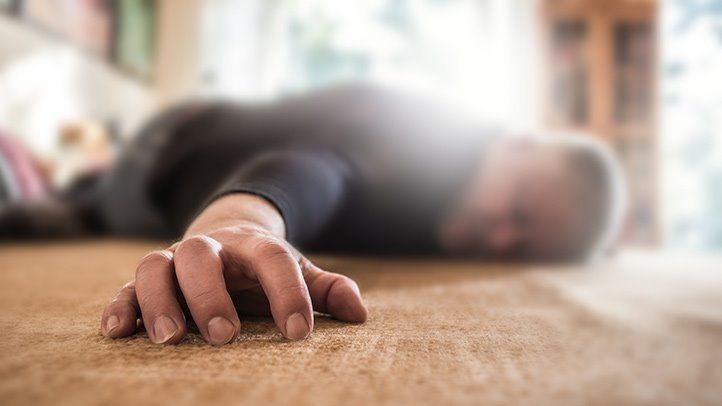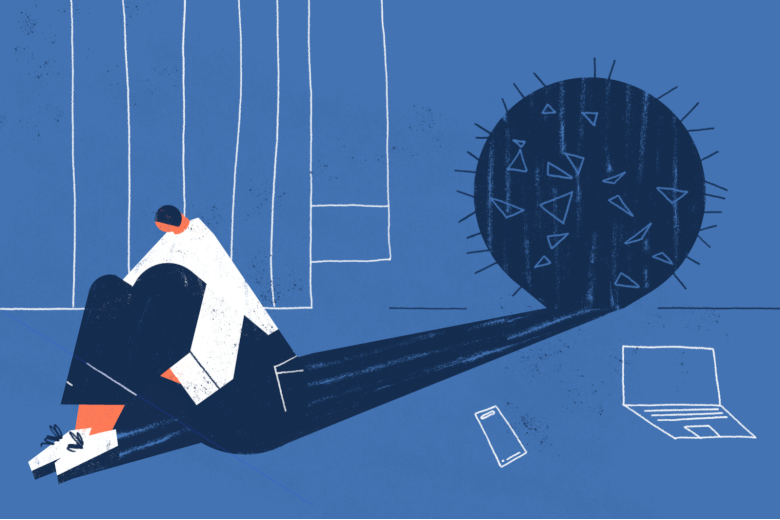Anxiety disorders are a huge problem, and as the population ages, so too does the number of people affected by anxiety. If you’re struggling with paralyzing anxiety and don’t know what to do, read on for all the information you need.
Contents
What is Paralyzing Anxiety?

Paralyzing anxiety is a very serious mental health condition that can make people feel completely paralyzed. It’s caused by an overactive and anxious mind that doesn’t allow the person to function normally.
Symptoms of paralyzing anxiety can include overwhelming fear, racing thoughts, constant worry, and difficulty concentrating.
No one diagnosis fits everyone with paralyzing anxiety, but it can often be treated with medication and therapy.
If you think you may have this condition, it’s important to talk to your doctor or mental health professional.
Anatomy of Paralyzing Anxiety
There is no one-size-fits-all answer to overcoming paralyzing anxiety, as the disorder can vary greatly from person to person. However, by understanding the anatomy of paralyzing anxiety, you can start to piece together the steps needed to overcome it.
Paralyzing anxiety typically starts with a single fear or worry that becomes so overwhelming that it takes over your life. The fear might be something as simple as being in public, speaking in public, or traveling. The worry might be about something unrelated, such as your job or health. Regardless of the trigger, these fears and worries keep you constantly on edge, leading to a constant state of stress and anxiety.
The way paralyzing anxiety affects your body is also unique for each person. While most people with paralyzing anxiety experience general feelings of stress and unease, some individuals experience intense physical symptoms. These symptoms can range from headaches to diarrhea to heart palpitations. Physically based symptoms are usually the first sign that something is wrong with your anxiety and needs to be addressed right away.
If left untreated, paralyzing anxiety can gradually take over your life, damaging relationships, work productivity, and overall quality of life.
Causes of Paralyzing Anxiety

There is no single cause for paralyzing anxiety, but it can be caused by a combination of factors. Some of the most common causes include genetic predisposition, life events, and neurological disorders.
Genetic predisposition
One of the most common causes of paralyzing anxiety is genetic predisposition. People who are genetically predisposed to anxiety are more likely to experience episodes of paralyzing anxiety than people who are not genetically predisposed to anxiety.
Life events
Several life events can trigger episodes of paralyzing anxiety. These events can include major changes in the person’s life, such as the death of a loved one or a traumatic event. These life events can also include smaller changes, such as a new job or a change in residence.
Neurological disorders
Paralyzing anxiety can also be caused by several neurological disorders, including:
Panic disorder
Obsessive-compulsive disorder (OCD)
Symptoms of Paralyzing Anxiety

Paralyzing anxiety is a very serious disorder that can seriously impede your quality of life. It is characterized by overwhelming feelings of fear and dread that can make it difficult to function day-to-day. Here, we discuss some of the most common symptoms of paralyzing anxiety.
Difficulty concentrating or thinking clearly: One of the most common symptoms of paralyzing anxiety is difficulty focusing or thinking clearly. This can lead to problems with both personal and professional life, as you find it difficult to keep track of your tasks and responsibilities.
Fear of public speaking: One of the most common fears associated with paralyzing anxiety is fear of public speaking. This fear can be so overpowering that you avoid any type of public event, even if it’s something as simple as a meeting with your boss.
Fear or avoidance of specific situations: Some people with paralyzing anxiety are extremely afraid or paranoid about specific types of situations, such as being in crowds or traveling outside the country. Another common symptom is the fear of any type of physical activity, such as going for a run or climbing a mountain.
Physical symptoms: Many people with paralyzing anxiety experience physical symptoms that can range from mild to life-threatening. These symptoms can include headaches, difficulty sleeping, diarrhea, and heart palpitations. These physical symptoms need to be addressed as soon as they arise, as they can indicate that something more serious is wrong with your anxiety.
Extremely intense fear or Panic attacks that last for hours or days on end: An extreme form of paralyzing anxiety is referred to as Panic disorder. This is a condition in which you experience repeated, intense episodes of fear or Panic that can last for hours or even days on end.
Diagnosing Paralyzing Anxiety
There is no single test that can definitively diagnose paralyzing anxiety. Instead, clinicians typically use a combination of clinical evaluation and laboratory tests to identify the cause of the person’s symptoms.
Clinical evaluation
During clinical evaluation, clinicians will typically ask the person about their symptoms and history. They will also ask the person about their lifestyle and personal preferences.
Laboratory tests
Clinicians may also use laboratory tests to identify the cause of the person’s symptoms. These tests include:
Blood tests
Heart rate tests
Brain scans
Treating Paralyzing Anxiety

There is no one-size-fits-all answer to overcoming this type of anxiety, as the disorder can vary greatly from person to person. However, by understanding the anatomy of paralyzing anxiety, you can start to piece together the steps needed to overcome it.
The first step is to seek out professional help. Your doctor or mental health professional can help you manage your symptoms and find the best treatment plan for you. They may also be able to provide you with medication or therapy that can help ease your anxiety.
Once you have started treatment, it’s important to keep up the effort. Treatment doesn’t always work overnight, and it will take a concerted effort on your part to overcome this type of anxiety. However, with the right support and guidance, you can overcome this debilitating disorder and enjoy a life free from fear and stress.
Some of the treatment methods are:
Medications
There are many medications available to help, but some people find them to be ineffective or have side effects. Here are some methods that may be more successful:
Medications such as benzodiazepines (such as Xanax or Valium) and selective serotonin reuptake inhibitors (SSRIs, such as Prozac or Zoloft) can be effective in managing paralyzing anxiety. These medications work by calming the nervous system and relieving symptoms. Side effects may include drowsiness, dizziness, and sexual dysfunction, so it is important to take these medications only as prescribed by a doctor.
Some of these medications can also be used to treat panic disorder. Panic disorder is a condition in which people experience recurrent episodes of intense fear or anxiety, which can interfere with daily life. Treatment typically includes medications and counseling.
Behavioral Modifications
Behavioral modifications are the primary form of treatment for this type of anxiety. The following are some of the most common behavioral modifications used to treat paralyzing anxiety:
– Cognitive therapy: This type of therapy encourages people with paralyzing anxiety to change the way they think about their anxiety and related situations. For example, they might be taught to recognize and confront their worried thoughts rather than ignoring them or struggling against them.
– Relaxation training: This involves teaching people how to relax their entire body, including their muscles, nerves, and mind. This can be done through self-help techniques or with help from a therapist.
– Exposure therapy: This is a type of therapy that helps people learn to tolerate feared experiences. For example, a person with paralyzing anxiety might be asked to do things like go on a roller coaster or participate in an ice cream social without getting scared.
– Group therapy: Groups can be especially helpful for people with paralyzing anxiety, as they provide a supportive environment in which to share experiences and learn strategies for managing anxiety.
Self-Care
Self-care is key in managing this condition, so it is important to find ways to relax and de-stress. Some of the most common methods for treating paralyzing anxiety include:
– Exercise: Exercise has numerous benefits, including reducing stress and improving mood. It can also help improve our overall physical health. In addition, exercise is an effective treatment for anxiety.
– Meditation: Meditation has been shown to reduce stress and anxiety. It can also improve your mental well-being by improving your concentration and focus.
-Eating Good: Eating a balanced, healthy diet can help reduce stress and anxiety. It can also improve your overall physical health.
– Sleeping: Sleeping is essential for both our mental and physical health. When we sleep, our body repairs and heals itself. In addition, sleeping can reduce stress levels and improve moods.
– Taking Supplements: Taking supplements can be a useful way to reduce stress and anxiety. Some of the most common supplements for reducing stress and anxiety include omega-3 fatty acids, magnesium, and B vitamins.
– Communicating with Others: It is important to communicate with others healthily. This can help reduce stress and anxiety.
Conclusion
If you’re like most people, you’ve probably been told that anxiety is something that just needs to be dealt with. You know, like a bad cold or the flu — something that’s impossible to prevent but can be overcome with a stiff upper lip and plenty of self-discipline? While this approach may work for some people, it doesn’t work for everyone. In fact, according to the National Institute of Mental Health (NIMH), up to 60% of people who suffer from chronic anxiety don’t respond well to traditional treatments. That’s where interventions such as cognitive behavioral therapy (CBT) and the ketogenic diet come in.
Hope this article was of help to you! If you are suffering from mental health disorders, you may seek help from Therapy Mantra. We have a team of highly trained and experienced therapists who can provide you with the tools and skills necessary for overcoming mental health disorders. Contact us today to schedule an online therapy or download our free Android or iOS app for more information.


